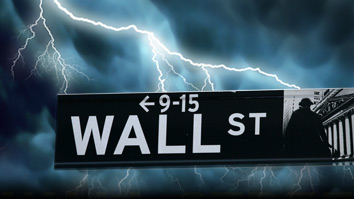A shock from the House
来自众议院的惊雷
The House of Representatives rejects the $700 billion bail-out plan
美国众议院否决了7000亿美元的救援计划
IT WOULD have been one of the most unpleasant laws that Congress had found itself writing so close to an election. Devoting $700 billion of taxpayers’ money to rescuing the country’s least popular industry was clearly not a vote winner. That Democratic and Republican congressional leaders held their noses this weekend and came up with the Emergency Economic Stabilisation Act was encouraging evidence that they appreciate the gravity of the financial crisis. But with a vote of 228 to 205, the House rejected it. World stockmarkets promptly slumped. At one point the Dow Jones industrial average had fallen than 700 points, its biggest intraday drop ever. The oil price slumped by $10 to less than $97 a barrel.
这可能是在如此靠近大选前国会最不愿签署的法案之一。将纳税人的7000亿美元用于拯救这个国家最不受欢迎的行业显然不会成为选举胜利者。民主共和两党国会领袖在上周末虽不情愿但又不得不努力商讨并且提出一个紧急经济稳定法案,这表明他们正在重视金融危机的影响。但是众议院却以228对205否决掉了这个提案。世界股票市场立遭重挫。道琼斯平均工业指数最低下跌700多点,是其单日内历史最大跌幅。油价暴跌10美元至不到每桶97美元。
The House voted against the bill despite the best efforts of the two candidates to be president. “This is something that all of us will swallow hard and go forward with,” John McCain had said. Barack Obama had added that “What we can’t do is do nothing.” As it stood on Monday, that was precisely what the House had chosen to do. The White House issued a statement expressing its severe disappointment and promising to get an economic team together to consider its next steps. It remains possible that the House will vote again. The Senate had been due to vote later in the week.
尽管两位候选人做出最大努力使这项法案通过,国会依然否决了此法案。麦凯恩曾说:”我们所有人所必须做的就是克服艰难,阔步向前。”奥巴马又加上:”当前我们绝不能无所作为。”然而以星期一的情况来看,众议院正是决定要”无所作为”。白宫对此发表声明表示非常失望并且保证会召集其经济执政团队以商讨下一步行动。众议院仍有再次投票表决的可能,而参议院将在本周晚些时候对此投票表决。
The bill had been widely expected to pass. Legislators from both parties wrung concessions from Hank Paulson, the treasury secretary, to provide necessary political cover. But voters seemed unconvinced. In a USA Today/Gallup Poll conducted on September 24th just 22% favoured Mr Paulson’s proposal while 56% wanted something different; only 11% preferred that no action be taken.
这个方案曾被广为期望能够通过。来自两党的议员从财政保尔森那里榨取一些妥协来向公众提供必要的政治籍口。但是选民显然没有被说服。在9月24日,《今日美国》和盖洛普进行的民意调查显示,只有22%的被调查者赞同保尔森的提案,而56%的人希望其它的方案,只有11%的人选择不要采取任何行动。
By legislative standards Congress moved at light speed after Mr Paulson and Ben Bernanke, the Federal Reserve chairman, proposed action on September 18th, warning of serious doom and gloom if nothing were done. In the past week the financial crisis has erupted in even more dangerous forms globally. The interbank-funds market has seized up and even the most creditworthy corporate and financial firms are paying punitive rates. Last week Washington Mutual became the largest-ever American bank to fail. In Europe, three countries had to come to the rescue of Fortis, a Belgian banking group, and Britain did the same with a mortgage lender, Bradford & Bingley. And on Monday Citigroup agreed to buy most of the assets of Wachovia, another beleaguered American bank, in a deal brokered by regulators.
在保尔森和美联储主席伯南克于9月18日警告如果不采取行动将会有极为严重的灾难和萧条后,国会的立法程序开始以光速运作。在过去的一周里,金融危机以更加危险的方式在全球爆发出来。银行间基金市场陷入停滞,许多信誉卓越的公司和金融机构不得不支付惩罚性的利率。上周,华盛顿互惠银行成为美国历史上最大的倒闭银行。在欧洲,三个国家开始营救比利时的富通银行。而英国也开始拯救其最大的抵押贷款机构–布拉德福德宾利集团。周一,在监管者的协调下,花旗集团也同意购买陷入困境的美联银行的大部分资产。
The new law would have provided the Fed with an additional tool for combating the latest stage of the crisis: from October 1st it would have paid interest on reserves that banks maintain at the Fed. This would have let it pump almost unlimited cash into the money market without fear of interest rates falling to zero, Japanese-style.
新的法案(如果通过的话)将给美联储对付最新阶段的危机提供了一个新的工具:从10月1日开始,美联储将会给银行存在美联储的资金付给利息。这就可以使其给货币市场注入无限多的现金而不必担心陷入利率为零的日本模式。
Mr Paulson or his successor would have been given $250 billion immediately, $100 billion more at the president’s discretion and $350 billion upon Congress’s approval. The Troubled Asset Relief Programme, or TARP, would be allowed to buy mortgage-backed securities, whole loans (those not bundled into pools) and, in consultation with the Federal Reserve chairman, anything else necessary to stabilise the financial system. That includes taking control of entire companies. Mr Paulson said on Sunday that would get the power to avert “the potential systemic risk from the disorderly failure of a large financial institution,” implying the ability to bail-out a company while punishing its owners, as was done with Bear Stearns, Fannie Mae, Freddie Mac and AIG. Given the frequency with which institutions are collapsing, he would have been keen to invoke that power soon.
保尔森和他的继任者会被立即给予2500亿美元,还有1000亿美元的使用依据总统批准,而另外3500亿美元的使用须经国会批准。问题资产救援计划(TARP)将会允许购买抵押债券,全额贷款(没有没打包进入证券市场的贷款),以及其它任何对稳定金融系统有需要的资产(这需要与美联储主席商讨)。保尔森周日表示将会获得阻止”来自大型金融机构混乱倒闭的潜在性系统风险”的力量,这意味着包括取得对问题公司的全权控制的权力,类似处理贝尔斯登,两房和美国国际集团的情况。在连续遭受金融机构垮台打击后,保尔森迫切需要尽快获得这个权力。












